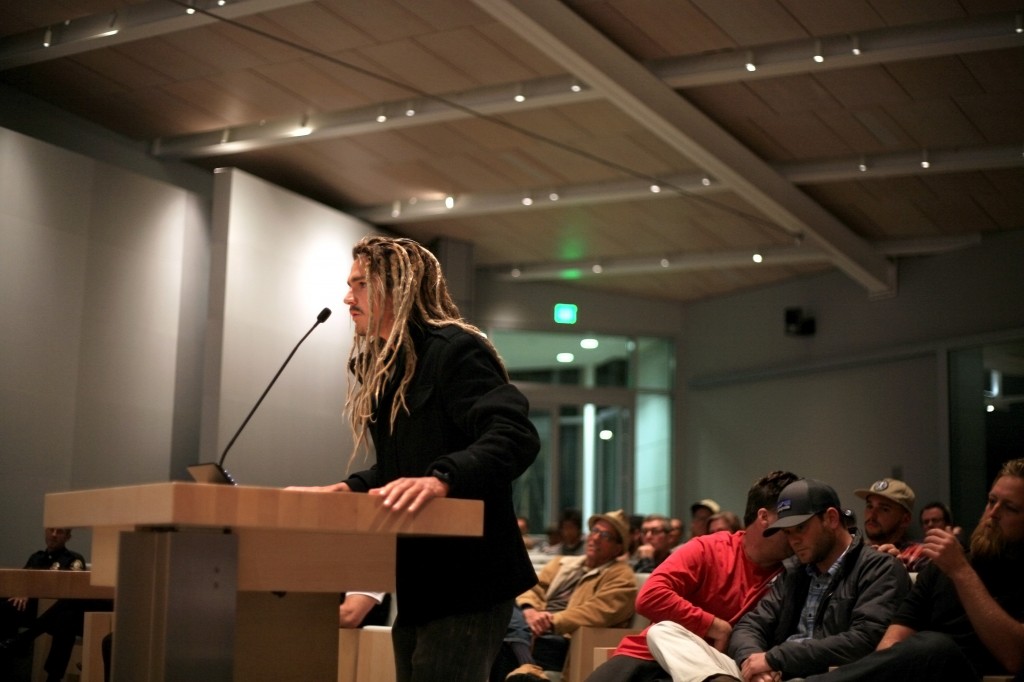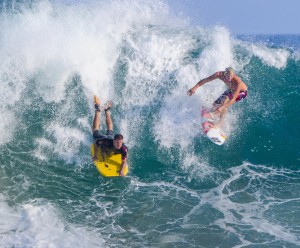
— Photo by Sara Hall
The rules that govern wave riders will remain the same, the Parks, Beaches and Recreation Commission decided this week.
At least, for the time being.
After more than two hours of discussion during Tuesday’s meeting, the PBR decided to keep the current blackball regulations in place. Blackball rules determine who is allowed in the water and when.
“All in all, I think we’re on the right path,” said PBR Vice Chair Ron Cole.

Cole later moved to deny the Blackball Working Group’s current recommended proposal, but to study the issue further and remain open to hearing a new recommendation at a later date, likely after gathering information during the summer season. The motion carried unanimously 5-0. Commissioners Kathy Hamilton and Laird Hayes were absent
The working group was established last fall to review the current resolution and municipal codes regarding surfing and floatation device restrictions and make recommendations to the council to optimize public safety and fair use, explained Newport Beach Fire Department Assistant Chief Rob Williams.
“I think the group has gone through a very thoughtful process,” Cole said.
Before deciding on the recommended resolution, “everything was off the table,” Cole said.
“We discussed every option,” he continued, from the option to “eliminate blackball to fully regulate blackball” and everything in between, he said.
The recommended resolution had included allowing the supervising Marine Safety Watch Commander, or designee, to blackball at any time of the year at any location. It also included all of Newport Beach to be blackballed between 11 a.m. and 4 p.m. between Memorial Day and Labor Day weekends.
Also suggested were three open access areas, available to swimmers, body boarders and surfers, between Orange Street to the city boundary at the Santa Ana River, 48th to 56th streets, and from 20 to 100 feet southeast of the Balboa Pier.
Proposed for the wedge was an adjustment from 20 to 600 feet from the west jetty and changing the time and dates for the “no floatation device” regulations.
By a show of hands, as prompted by PBR Chair TomAnderson prior to public comment, the audience indicated about half were in favor of the resolution and half against it.
More than 100 people attended the meeting, 42 of which spoke on both sides of the issue during public comment.
Residents suggested alternating times and days, moving the designated areas slightly and doing more extensive research.

The issue of liability was also brought up by several residents, stating it as a cause for concern for the city.
While most speakers commented on the wedge, the area between 40th and 44th streets was also discussed.
Lance Jencks was one of the most passionate speakers of the night. The longtime resident said that 2013 was his 48th season body surfing the wedge.
He used to start at 7 a.m. and would stay in the water until 11 a.m., he explained, because that’s when the wind kicks up.
“There isn’t a single person in this room that doesn’t want to surf the glassy waves in the morning,” Jencks said as he got emotional.
“When I saw your history (during the presentation) it broke my heart because I used to be there in the morning,” Jencks said. “And then, at some point, you kicked me out.”
Jencks, 66, made his own proposal.
“I figure I’ve got 10 years left,” Jencks said. “If you’re going to change these hours, do it in 2024.”
Bob Cook commended the working group, saying they listened to all sides of the issue and the recommended changes were a fair compromise.
“Everyone wants their cake and eat it too,” Cook said. “And this really has to be a compromise, in my opinion.”
He agreed with the wedge parking complaint mentioned by a few other speakers.
“It’s a circus,” he said. “But, in reality, the circus happens with the laws the way they are now, not the changes. So we have a circus no matter what when the waves are good.”
Costa Mesa resident Margarita Rosenberg agreed.
“You take blackball out, we’re going to have a fiasco in Newport Beach,” she said
That’s not the image locals want to the city to send out, she said.
Professional skim boarder Austin Keen also supported the proposal.
“It’s not really about who’s getting the waves and who’s not getting the waves,” he said. “I think what we’re here to do is just to break it up and try to share more.”
Body surfers essentially get waves from dawn until dusk, he argued.
“We’re just trying to extend our time in the water by one hour in the morning and by one hour in the evening,” Keen said.
On the other side of the issue was Brandon Kennedy, who suggested denying the proposal and keeping the rules as they currently stand.
“It really breaks down to this: It’s really an issue of safety,” he said.
He understood the commission’s position to try and make it as fair as possible for everyone, but the wedge can be very dangerous, he cautioned, there have to be rules.
After the presentation and public comments, Commissioner Roy Englebrecht questioned why they were considering changing the rules at all.
“Why in the world are we even here on this subject?” he asked. “You have not convinced me, in any way, to justify any change that you’re bringing forth to this commission.”
He moved to veto the entire item and discard any further discussion of the matter. The motion failed with no second.
Anderson and commissioners Walt Howald and Marie Marston also questioned if there was a reason to make any changes to current blackball regulations.
“I think part of this is cleanup,” Cole responded. “It’s modifications to meet reality.”
Several of the speakers noted that it comes down to sharing the water.
“I don’t want this to be used to divide wave riders,” Rosenberg said. “We are all wave riders and we all love the ocean.”




